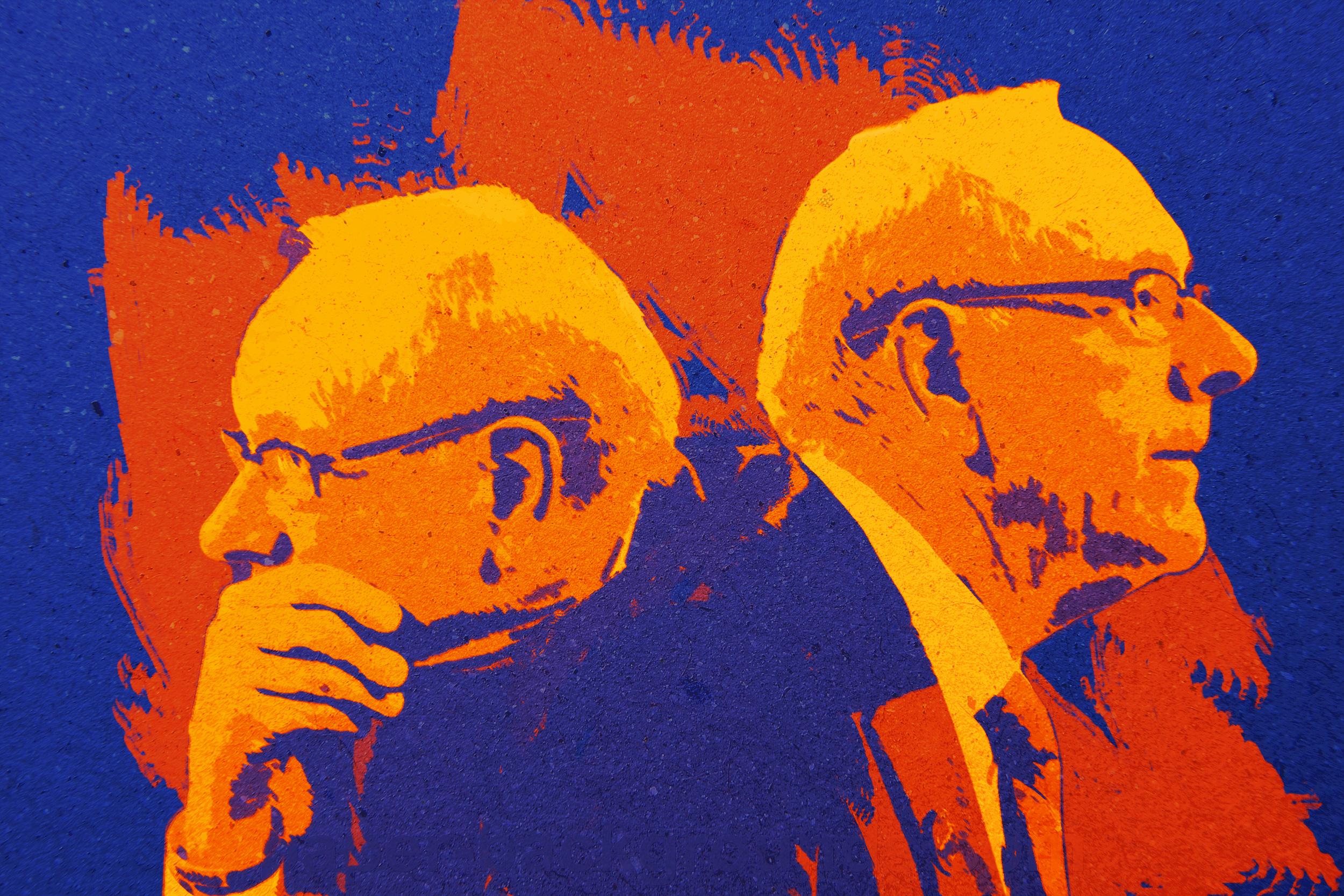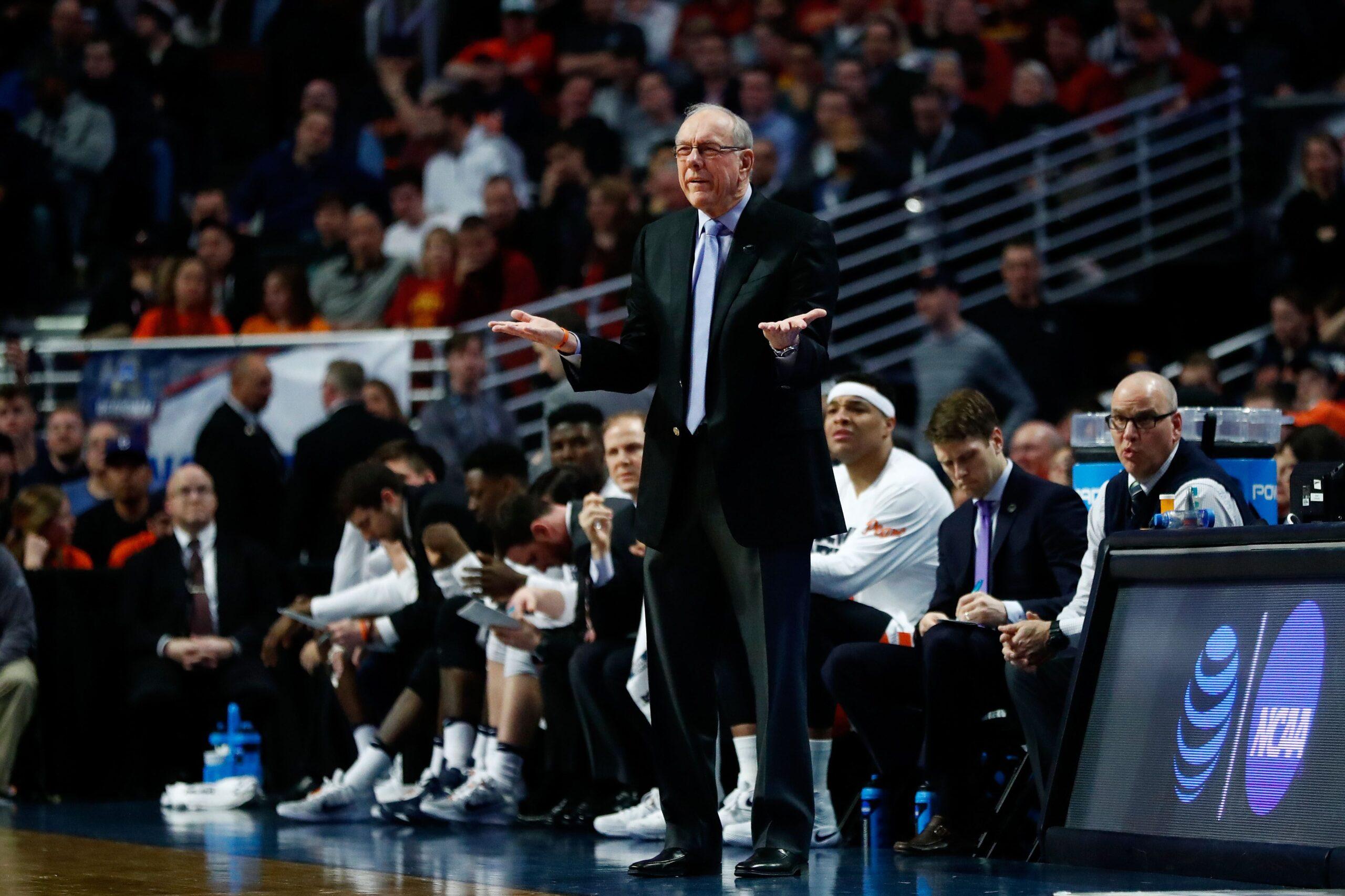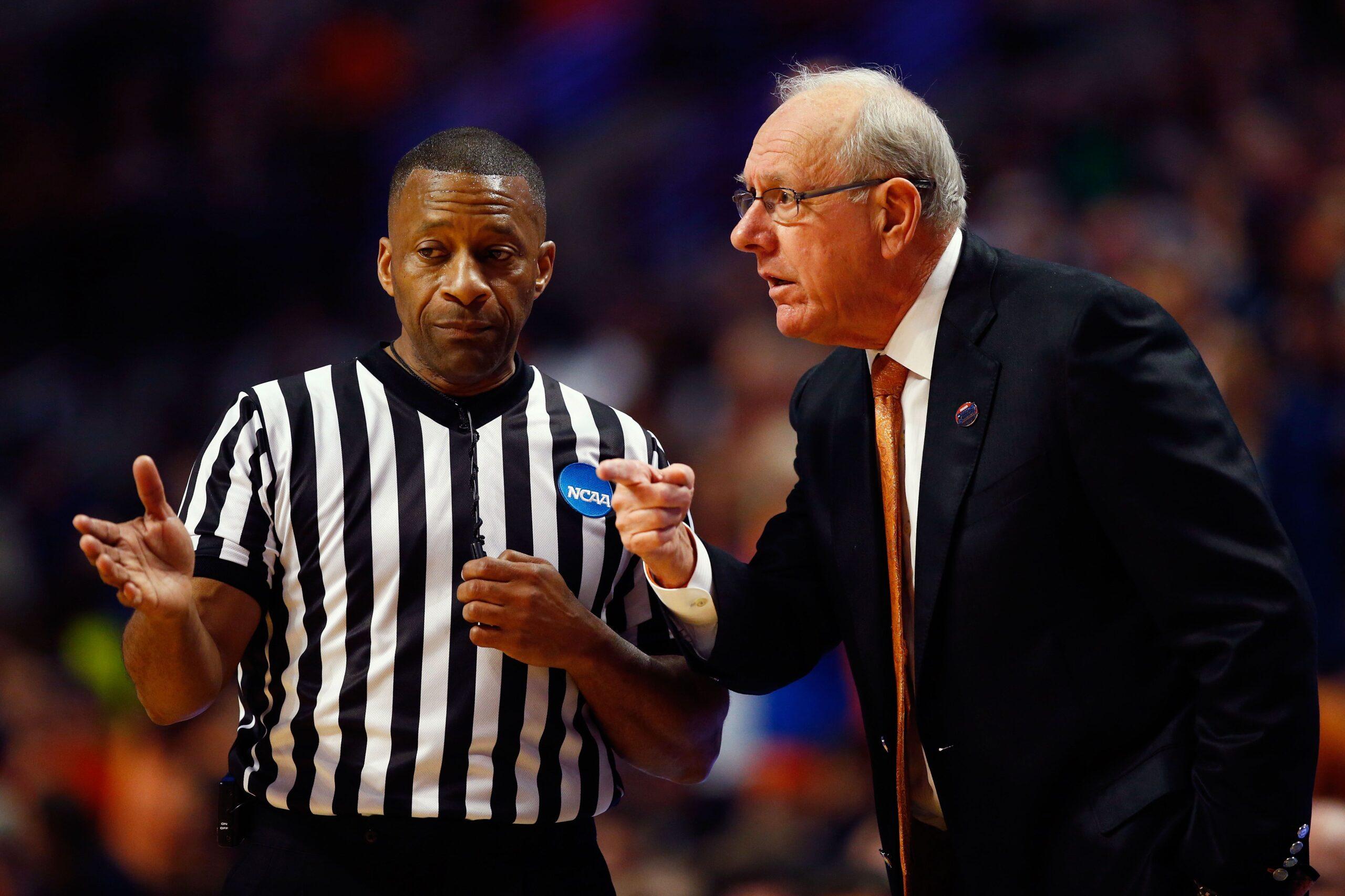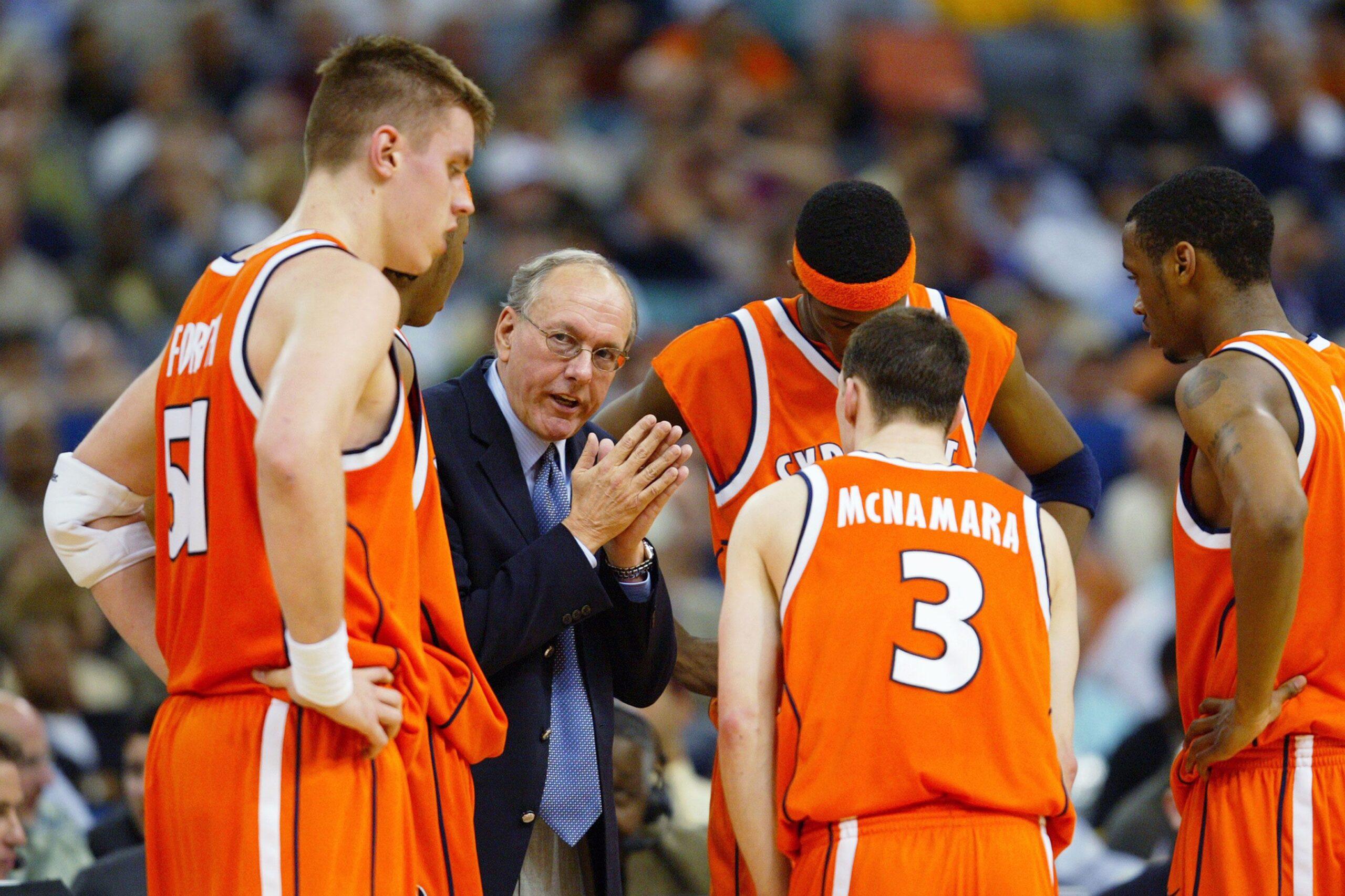Jim Boeheim Is the Greatest Coach Who Never Fit the Part
The longtime Syracuse coach has been labeled as a winner, a whiner, a defensive genius, and a crybaby. As Boeheim prepares to enter his 42nd season at the helm, what is his legacy?
Jim Boeheim is one of the greatest college basketball coaches to ever live.
If you’re a die-hard fan of the sport, chances are that sentence elicited some sort of visceral reaction. Maybe you nodded along in agreement. Boeheim, after all, has won 903 games as Syracuse’s head coach, placing him directly behind Mike Krzyzewski as the second-winningest Division I men’s coach of all time. He’s won a national championship, made Final Fours in four different decades (1987, 1996, 2003, 2013, and 2016), and sent countless players to the NBA. He’s a Naismith Hall of Famer whose name cannot be omitted when telling the stories of the two greatest college basketball conferences to ever exist (the original Big East and the current ACC). It shouldn’t be that controversial to claim that Boeheim’s career is on par with those of legends like Coach K, John Wooden, Adolph Rupp, Bob Knight, and Dean Smith.
And yet, it’s likely that the first sentence of this piece made you recoil in disgust. Boeheim has a knack for engendering contempt in neutral fans, as he’s long been known as one of the sport’s most notorious curmudgeons. But unlike other top coaches who fit that description, Boeheim has never had much charisma (like, say, Bob Huggins) or an intimidating presence demanding of respect (like Knight). Instead, he’s had the persona of a whiny toddler who holds onto petty grudges and frequently butts heads with the media. That’s stuck him with a public image that has understandably alienated casual observers.
And that’s to say nothing of his coaching résumé, which can be picked apart by even the most level-headed critic: He’s racked up his wins by playing laughably easy nonconference schedules that expose him for the fraud he is when the NCAA tournament rolls around. He’s found success only with a gimmick (his 2-3 zone defense). He’s produced one and a half relevant NBA players in the past 25 years, and his 2003 national championship was more a result of Carmelo Anthony’s brilliance than anything that Boeheim did. If Carmelo hadn’t carried him to that title, Boeheim would be thought of as an average coach who stayed at one school forever. Tyler Olander won more national championships in four years as a player than Boeheim has in 40-plus years as a coach. It’s frankly insulting to even mention him in the same breath as the TRUE all-time coaching greats.
Boeheim will turn 73 on November 17. He is entering his 42nd season as Syracuse’s head coach after spending seven years as a Syracuse assistant and four years as a Syracuse player before that. The Orange were up-and-down a season ago, losing in the second round of the NIT to cap a 19-15 campaign that was among the worst in Boeheim’s career. And while help is on the way next season in the form of five-star recruit Darius Bazley (and Boeheim’s son, Buddy!), the 2017-18 version of Syracuse seems likely to be even worse than the 2016-17 group, especially considering that the Orange will return only one starter following forward Taurean Thompson’s transfer to Seton Hall in September. Meanwhile, Boeheim’s most trusted assistant of the past two decades, Mike Hopkins, is now Washington’s head coach—a position he accepted less than two years after being named the designated coach-in-waiting at Syracuse in 2015. It would be reckless to suggest that Boeheim will never coach a nationally relevant Syracuse basketball team again, but it also doesn’t take a wild imagination to envision a scenario in which that becomes the case.
All of this, of course, is a roundabout way of saying that now feels like a good time to start trying to parse Boeheim’s legacy. Because while he’s one of the most fascinating figures the sport has ever seen, he’s also nearly impossible to pin down. I’m oversimplifying things, but it feels like all of the other all-time coaching greats have distinct identities: Wooden was a mild-mannered teacher whose lessons included showing his players how to put on their socks; Dean Smith was a players’ coach long before anyone started using the term; Krzyzewski is a LEADER OF MEN; Knight was an asshole disciplinarian; and Rupp was a superstitious racist who in the 1950s began one of the great college basketball traditions in the state of Kentucky by claiming that he had no idea that severe NCAA violations were happening in his program. Boeheim, meanwhile, is an enigma. If you asked 50 different fans to describe Boeheim in a single sentence, you could get 50 different answers. He’s a whiner. He’s a winner. He tells it like it is. He’s an underachiever. He’s a defensive genius. He’s an abysmal X’s-and-O’s coach. He cares deeply for those closest to him. He throws his players under the bus. He’s a cheater. He’s a great recruiter. He can’t win the big one. He’s lazy, he’s a head case, he’s desperate to be loved, he always has an excuse at the ready, and he just can’t stop picking his nose.
All of these assessments are fair to varying degrees, but none alone come close to capturing Boeheim’s essence. Which brings me to what I think Boeheim’s legacy should be: He’s the most everyman Hall of Fame coach in college basketball history.

In the summer of 2015, I set out to read as much about Syracuse as I possibly could. My plan was to spend that offseason researching programs that I wasn’t as familiar with as I should be, and the Orange fit that bill perfectly. Syracuse has a fan base unlike any in college basketball—and I don’t mean that in a disparaging way. I mean that Syracuse fans are irrational about their basketball team to the point that it makes me uncomfortable to even talk to some of them. There are plenty of other crazed fan bases out there, most notably Kentucky’s Big Blue Nation. But Kentucky fans are much like Game of Thrones diehards; there are a ton of passionate ones, yet that only feels natural given the Wildcats’ virtually ubiquitous presence. Syracuse fans, though? They’re more like the people who obsess over Rick and Morty, only instead of losing their minds over some sauce from McDonald’s, they go nuts for a basketball team that’s located in the middle of nowhere, has made only a handful of Final Fours, and has won just one national championship. I was desperate to make sense of this, so I read every Syracuse book I could get my hands on.
Two things stood out from my reading. First, people with ties to Syracuse can’t resist making fun of the city of Syracuse. This theme popped up in everything that I read. Syracuse is a shithole with nothing to do and where it snows for 300 days a year, and I will never forgive my ancestors for settling in this godforsaken part of the world. The important catch here, though, is that the authors of these books always insulted their city in an endearing way, where the subtext “… but it’s my home and that’s reason enough to love it” shined through in every complaint. It also was obvious that these complaints were NOT invitations for outsiders to join them in tearing down Syracuse, which is critically important to note.
The other thing that jumped out was that Boeheim is entirely self-aware. Not every book I read focused on Boeheim, or even the basketball program for that matter. Yet the ones that did made clear that the longtime Syracuse coach knows exactly what people think about him. What’s worse, he doesn’t hide the fact he cares what people think.
On Page 2 of his 2014 autobiography, Bleeding Orange—Page 2!—Boeheim addresses his anxieties in length, writing that he has “a fear of failing every day.” He mentions how winning never makes him happy but losing always makes him sad. In recalling his national championship triumph in 2003, Boeheim writes, “Those feelings of euphoria lasted about two days, maybe three. Then it was time, once again, for worry. Time, once again, for fear.” His book is littered with memories of being slighted, including the time that Dave Schellhase took the roster spot on the 1966 Chicago Bulls that Boeheim felt he deserved. (“[Schellhase] played exactly 73 games over two seasons. I guarantee that, out of pure stubbornness, I would’ve lasted longer than that.”) Or the time Magic Johnson was named MVP of a 1977 early-season tournament even though Syracuse beat Michigan State in the title game and it was obvious (to Boeheim, at least) that Marty Byrnes should have won the award. Boeheim even mentions that he inherited a great memory from his parents, which feels like a throwaway line at first but is meaningful when you consider how often he uses this memory to address his critics.
This is not the way that college basketball coaches are supposed to operate. They’re supposed to be infallible leaders who don’t concern themselves with the opinions coming from outside of their locker room. They’re supposed to remain stoic and exude confidence at all times, even in the face of adversity. In other words, they’re supposed to be robots who take themselves way too seriously, speak in nothing but clichés, and feed into a cult of personality. That’s not Boeheim and never has been. And the more you know about his life before he became Syracuse’s coach, the more it makes sense.
Just look at the mentors of the best college basketball coaches throughout history. Smith and Rupp were disciples of Kansas legend Phog Allen, who himself was a disciple of James Naismith, the guy who invented the damn game. Krzyzewski played at Army under Knight, who played for and learned from Hall of Famer Fred Taylor at Ohio State. Wooden’s coach at Purdue was Hall of Famer Ward Lambert, while Roy Williams owes his career to Smith. The list goes on and on. The qualities that are associated with great head coaches have been passed down through the generations, and seem to be more learned than they are innate. (One notably great coach who hasn’t been linked to an accomplished mentor is three-time Connecticut national champion Jim Calhoun, who had a unique reputation and personality and only helps in proving the point that fitting the mold of a traditional college basketball coach is a cultivated skill.)
The best take lessons from the best, only Boeheim was never so lucky.

Boeheim was born and raised in Lyons, New York—a town with a population under 6,000 that sits about an hour west of Syracuse—by an ultra-competitive father who treated him as a rival more than a son. (In Bleeding Orange, Boeheim writes, “My father had a good side but managed to keep it pretty well hidden.”) According to Boeheim’s recounting, his dad kicked his ass in everything they did together, to the point that Boeheim’s childhood probably resembled the dodgeball scene from Billy Madison. The competition was so fierce that some of the people closest to Boeheim have theorized that a major reason he might have been drawn to basketball is that he knew he could become better at it than his dad, who as a result of being accidentally shot as a youth had a bullet lodged in his spine and walked with a limp. Whatever the case, Boeheim was, by his own admission, a loner who was raised by an overbearing father who wanted to DESTROY him in everything. That was how he was brought up to see the world.
The skinny kid from Lyons with thick glasses eventually became a walk-on basketball player (and golfer!) at Syracuse, where he was bullied by football players as a freshman. (From Bleeding Orange: “They would beat your ass and throw you in the shower. In the dining hall, they would reach down and literally take the steak off your plate.”) He earned a scholarship only when a teammate was kicked off the team, and even then he had to fight to forge an identity as anything other than the walk-on who was the roommate of star guard Dave Bing. Boeheim blossomed into a pretty solid player, averaging 14.6 points per game as a senior for an Elite Eight team before playing a few years of semi-pro ball after graduation. Then he tried out for the Bulls, got cut in favor of Schellhase, and went back to Syracuse as an unpaid graduate assistant for the basketball team and the head coach of the golf team.
Boeheim’s college head coach, Fred Lewis, went 91-57 in his tenure from 1962-68, with his greatest career achievement being that he convinced Bing to come to Syracuse. Meanwhile, Roy Danforth, the man who Boeheim worked as an assistant under and ultimately replaced at Syracuse, is most famous for improbably taking Syracuse to the 1975 Final Four … only to leave in 1976 to take the head-coaching position at Tulane. Danforth went 45-90 in five seasons with the Green Wave.
These were the men who showed Boeheim the way. His peers got to learn the ropes from Hall of Famers; Boeheim had a ruthless father and some coaches who were largely irrelevant. (To be fair, Boeheim’s high school coach, Dick Blackwell, is apparently a local legend whom Boeheim respects a great deal.) He took what talent he had and enrolled at the local college as a walk-on, where he got his ass kicked and had to fight for every ounce of respect he was given. Then, at 31 years old, he was handed the keys to the Syracuse basketball empire when his predecessor abruptly left town. With that background, how could he have not become insecure and grumpy?
I don’t mean to suggest that Boeheim should be absolved of blame for anything stemming from his cantankerous attitude. It’s not like he should get a free pass to do whatever he wants just because his dad was an asshole. I’m just trying to provide some context. Boeheim doesn’t fit the part of a legendary college basketball coach because he never fit the part. He’s always been a cranky, regular-ass dude who has lived his entire life within a 200-mile radius and has tried to make the most of the opportunities that were given to him. That’s a reality to which many of us can relate. There are tons of head coaches who go to great lengths to pretend that they have it all figured out. Boeheim never bothered with the charade. While that’s rubbed a lot of people the wrong way, I find it pretty damn refreshing.
This is why Syracuse fans revere the man so much. It’s not that they don’t see what the rest of us see. They know that Boeheim is petty and insecure and sometimes keeps it too real. They know that he’s probably not as good a coach as Krzyzewski or Wooden. They know that he has a short fuse, that he schedules cupcake opponents in November, and that he relies on a 2-3 zone that can feel gimmicky at times. But he’s one of them. And not in a manufactured “you coach my team, so therefore I like you” type of way. He’s truly, genuinely one of them. He was born and raised in central New York; he went to school there; he made a name for himself there; and he’ll die there. That kind of thing holds water everywhere, but especially in places like Syracuse.
Remember the self-deprecating attitude the authors of those books had toward Syracuse? That’s a defense mechanism. They know that the rest of the country thinks their home is a dump and that there’s no use arguing otherwise. But there’s something in all of us that makes us proud of where we’re from, and Boeheim (or more accurately, the basketball program he built) provides a tremendous source of pride for locals and students alike. He’s not just a native son—he personifies the chip-on-the-shoulder attitude that many central New Yorkers have, and all the insecurities that come with it. And most important of all, he stayed. He could have used Syracuse as a launching pad to boost his stock before leaving for greener pastures, like Danforth tried to do. But Boeheim remained true to his roots and treated this job like it was the most coveted in the sport, and in doing so validated the entire community. It makes sense, then, that Syracuse fans can seem so irrational when talking about their team and their coach.
The rest of the world sees Boeheim as a guy who brought a ton of talent through his program and won only one national championship with it. But Syracuse fans can’t believe he ever got all that talent to come to the humble place they call home in the first place, and are endlessly thankful that he set the stage for Hakim Warrick’s historic block that delivered a national title.

Maybe it’s too soon to start sorting through Boeheim’s legacy. As I laid out in an August piece about Krzyzewski, and as Rick Pitino proved with his abrupt ouster in September, the end for college basketball coaches typically arrives sooner than most people think. Perhaps Boeheim has a few more aces up his sleeve and can take the Orange on another improbable Final Four run, like he did in 2016 (as a no. 10 seed), 2013 (no. 4 seed), and 1996 (no. 4 seed). Still, it’s all but guaranteed that he’ll never win over his critics, who would likely consider him a second-tier coach even if he somehow won another national title. He’ll never outrun his reputation as a bitter man who can’t let grudges die; he’ll never stop calling out reporters who say or write unflattering things about him; and he’ll never lose the parts of him that he inherited from his father. More than two decades ago, Boeheim swore he had become a changed man when he met his now-wife, Juli; two decades from now, we’ll probably still be waiting to see what those changes look like.
And that’s OK. Because despite what public perception about Boeheim suggests, there’s nothing all that wrong with him. He’s been loyal to a fault, most egregiously when he defended assistant coach Bernie Fine against allegations of sexual assault in 2011, called those who accused Fine liars (some of whom later admitted their claims were fabricated), and was eventually sued for defamation. Other times, that loyalty has taken the form of media rants, like when he unleashed his famous TEN FUCKING GAMES defense of Gerry McNamara at the 2006 Big East tournament. There’s a delicate balance to be struck with this stuff, and 55 years after he first set foot on Syracuse’s campus, Boeheim isn’t all that close to figuring it out.
Which brings us back to the million-dollar question: How should Boeheim be remembered? Will he go down as the most overrated coach that the sport has ever known? Or is he a legend whose résumé speaks for itself? Is he a prickly and stubborn man whose insecurities are just as sad as they are embarrassing? Or is he a loyal leader who sticks up for his players when it matters most? The answers to these questions will always depend on who you ask. All that can be said for sure is that Boeheim has earned the right to not give a damn what anyone else thinks. And that’s a right that he’ll never exercise. Because if he did, he wouldn’t be Jim Boeheim.